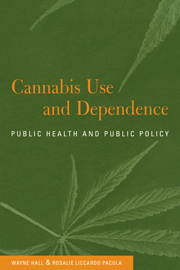Book contents
- Frontmatter
- Dedication
- Contents
- List of figures and tables
- Foreword
- Acknowledgements
- 1 Introduction
- Section 1 Cannabis the drug and how it is used
- Section 2 The health effects of cannabis
- 4 The acute effects of cannabis
- 5 The cellular, immunological and reproductive effects of chronic cannabis use
- 6 The cardiovascular, respiratory and gastrointestinal effects of chronic cannabis use
- Section 3 The psychological effects of chronic cannabis use
- Section 4 Effects on adolescent development
- Section 5 Harms and benefits of cannabis use
- Section 6 The effectiveness and costs of cannabis prohibition
- Section 7 Policy alternatives
- Appendix 1
- Appendix 2
- References
- Index
5 - The cellular, immunological and reproductive effects of chronic cannabis use
from Section 2 - The health effects of cannabis
Published online by Cambridge University Press: 05 July 2016
- Frontmatter
- Dedication
- Contents
- List of figures and tables
- Foreword
- Acknowledgements
- 1 Introduction
- Section 1 Cannabis the drug and how it is used
- Section 2 The health effects of cannabis
- 4 The acute effects of cannabis
- 5 The cellular, immunological and reproductive effects of chronic cannabis use
- 6 The cardiovascular, respiratory and gastrointestinal effects of chronic cannabis use
- Section 3 The psychological effects of chronic cannabis use
- Section 4 Effects on adolescent development
- Section 5 Harms and benefits of cannabis use
- Section 6 The effectiveness and costs of cannabis prohibition
- Section 7 Policy alternatives
- Appendix 1
- Appendix 2
- References
- Index
Summary
This chapter reviews the evidence on the effects of chronic cannabis use on three aspects of users’ health. It begins with a review of the effects of cannabis use on cellular function. This focuses on the capacity of cannabis to produce mutations in body and germ cells that may produce cancers. The second section reviews evidence on the effects of chronic cannabis use on the immune system. The third section considers the possible effects of chronic cannabis use on users’ reproductive systems. This is an important issue because cannabis is most heavily used by young adults during their early reproductive years and a substantial minority of women use cannabis during their pregnancies.
Mutagenicity and carcinogenicity
If THC or other cannabinoids produce mutations in the genetic material of a user's somatic or body cells (such as those of the lung) then chronic cannabis use could be a cause of cancer. If it produces changes in the genetic material of germ cells (the sperm and ova), then genetic mutations could be transmitted to the children of cannabis users. Studies of animal cells suggest that THC can produce changes in cellular processes in the test tube, including cell metabolism, DNA synthesis, and cell division (Nahas, 1984). The effect of these changes, however, seems to be to stop cell division rather than to produce cellular changes that lead to cancer (MacPhee, 1999).
There is no evidence that THC and other cannabinoids are mutagenic in microbial assays, such as the Ames test (MacPhee, 1999). There is contradictory evidence on whether THC can produce breaks in chromosomes (Marselos and Karamanakos, 1999). MacPhee (1999) has argued that even if the cannabinoids do produce chromosomal abnormalities these are more likely to lead to death of the affected cell than to its malignant transformation. A recent study of carcinogenicity in rats and mice found no evidence that THC was carcinogenic (Chan et al., 1996).
There is more consistent evidence that cannabis smoke, like the smoke produced by burning tobacco, is mutagenic in vitro, and hence, is a potential carcinogen (Leuchtenberger, 1983; Marselos and Karamanakos, 1999).
- Type
- Chapter
- Information
- Cannabis Use and DependencePublic Health and Public Policy, pp. 46 - 59Publisher: Cambridge University PressPrint publication year: 2002



